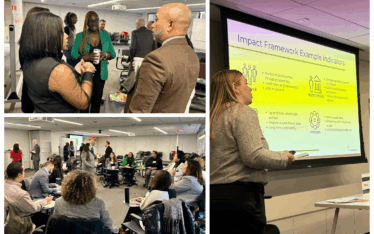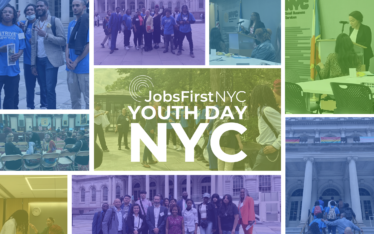During his address to Congress last Wednesday, President Biden unveiled an impressive American Families Plan aimed at helping marginalized American families get back on their feet after years of economic struggle, which has been further exacerbated by the COVID-19 pandemic. This sweeping plan includes a request for a more than $290 billion investment for higher education. According to the plan, “American workers need and deserve additional support to build their skills, increase their earnings, remain competitive, and share in the benefits of the new economy.”
At JobsFirstNYC, we applaud this bold effort to recognize the value that community colleges provide to millions of less fortunate Americans. Underfunded community colleges have led to lower retention and graduation rates. In order for there to be equitable recovery across the country – including in New York City – there needs to be a major push toward quality education at all levels and toward dynamic skills training that is accessible to everyone. The American Families Plan would do just that, rectifying America’s overpriced and broken postsecondary education system which has historically put opportunities for economic advancement out of the reach of those who need it the most.
The most notable part of the plan is that all American’s who want to pursue a college degree, will be provided with two years of free tuition at community colleges. This $109 billion investment has the potential to increase enrollment in four-year colleges over the long term because it would allow many young people to get a jumpstart on their education right out of high school but without having to take on suffocating debt. For New Yorkers, free community college would help clear a direct pathway from high school to postsecondary education at any of the seven CUNY Community College campuses across the city’s five boroughs.
At JobsFirstNYC, we have collaborated with CUNY to develop innovative career pathways to higher education through partnerships such as the Transfer 2 Career Collaborative, Youth WINS, Bronx Opportunity Network and YES Bed Stuy to support students from low-income families. These partnerships have proven that community colleges not only provide a valuable college education, but also connect students to the necessary skills training to prepare them for successful careers.
Some other highlights from the plan include investments to:
- Keep students on track to graduate: A record $62 billion has been earmarked for investments in effective strategies that help keep college students on track to graduate and achieve their degree. This would be a huge win for students who struggle to stay in school because of financial constraints, family obligations, and having to juggle multiple low-paying jobs. This portion of the plan would be further supported by a variety of wraparound services ranging from childcare to faculty and peer mentoring.
- Support underfunded institutions primarily serving Black Indigenous and other people of color: Biden’s plan acknowledges the huge disparity in funding that has plagued colleges and universities that serve mostly minority students. Under this plan, Historically Black Colleges and Universities, Tribal Colleges and Universities, and institutions such as Hispanic, Asian American, Native American Pacific Islander, and other minority-serving institutions stand to receive $46 billion. In addition, families that make under $125,000 would receive two additional years of tuition subsidies.
- Expand Federal Pell Grant: The plan includes an $80 billion commitment to expand the Pell Grants, doubling the current maximum grant award. As noted in the plan, “Among students of color, nearly 60 percent of Black, half of American Indian or Alaska Native, almost half of Latino, and over one-third of Native Hawaiian or Pacific Islander students rely on Pell Grants to pay for college.”
We celebrate the president’s announcement of the American Families Plan and the promise it holds for securing much-needed education reform and funding. Together with our partners, we are going to amplify our calls for Congress to enact this legislation on behalf of young people in America.





